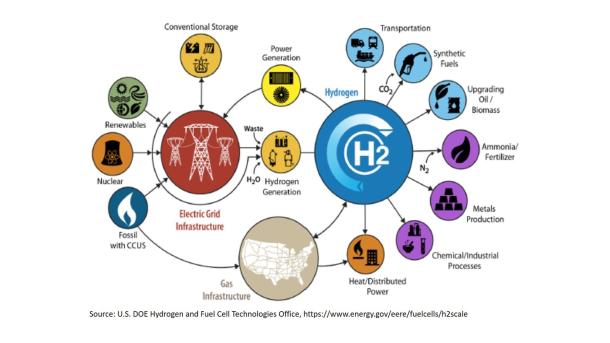
Hydrogen
The Challenge: Reducing the Cost of Clean Hydrogen
Clean hydrogen is an essential part of the U.S. plan to achieve net-zero carbon emissions by 2050. The U.S. Department of Energy (DOE) has made hydrogen the first of its “Energy Earthshots,” an initiative that aims to accelerate breakthroughs of more abundant, affordable, and reliable clean energy solutions. In June 2021, DOE set its “1 1 1” goal — reduce the cost of clean hydrogen by 80% to $1 per 1 kilogram in 1 decade.
Argonne Delivers Multi-faceted Expertise
Argonne National Laboratory is enabling hydrogen and fuel cell adoption on multiple fronts:
- Making fuel cells and electrolyzers more affordable and durable
- Lowering the price at the pump
- Improving the efficiency, durability and cost of fuel cell trucks
- Quantifying the carbon footprint of hydrogen production and use
Leveraging MidwestPower
The Midwest can produce hydrogen from clean, low-carbon sources such as nuclear energy, wind energy, biomass and by-product sources, and use hydrogen in transportation, petroleum refining, and ammonia and steel production. Argonne has been working with stakeholders including with DOE and universities to enable a Midwest hydrogen partnership for regional production and utilization of hydrogen with adequate infrastructure for hydrogen production, distribution and refueling. The Midwest Hydrogen Partnership founded by Argonne and the University of Illinois Urbana-Champaign is just one example of collaboration aimed at realizing a prosperous hydrogen economy in the region.
Accelerating Hydrogen R&D
With the emergence of new technologies to produce clean hydrogen from a variety of sources — along with applications including transportation and manufacturing — comes the need to quantify the carbon footprint. Argonne’s Greenhouse gases, Regulated Emissions, and Energy use in Technologies (GREET) model enables life cycle analysis of energy, emissions, and water effects of vehicle technologies and energy systems from cradle to grave.
The Hydrogen Delivery Scenario Analysis Model (HDSAM) developed by Argonne powers a suite of models to conduct techno-economic analysis of hydrogen production, delivery and refueling, and production of synthetic fuels and chemicals from renewable hydrogen and CO2 sources.
Argonne researchers also are developing new materials and evolving existing materials to make hydrogen-fueled polymer electrolyte fuel cell (PEFC) systems cost-competitive. These high efficiency alternatives to conventional power systems for transportation, portable power and stationary applications enable energy resiliency and rapid refueling.
Argonne is helping to make hydrogen cheaper at the refueling station by developing new hydrogen station designs that lower the cost and increase the efficiency of dispensing. Argonne’s new designs have been licensed by PDC Machines, a global compressor manufacturer for new station construction.
Partnering for Progress
Argonne collaborates with DOE, other national laboratories, and other partners to advance hydrogen science and technology. As the leading U.S. laboratory for engineering system modeling and analysis of fuel cell systems, Argonne co-led modeling and analysis for the DOE H2@Scale initiative to advance affordable hydrogen production, transport, storage, and utilization to enable decarbonization and revenue opportunities across multiple sectors. The laboratory is currently contributing to the development of the national hydrogen and clean hydrogen standards and provides information for legislation including hydrogen production tax credits.
As co-leader of the Electrocatalysis (ElectroCat) Consortium of DOE’s Hydrogen and Fuel Cell Technologies Office (HFTO), Argonne is helping develop catalysts for both fuel cells and electrolyzers that use abundant, less-costly metals such as iron, cobalt and nickel. Working with their counterparts at other national labs, Argonne researchers in HFTO’s Hydrogen from Next-Generation Electrolyzers of Water (H2NEW) consortium work to improve the performance and durability of electrolyzers.
As a partner in HFTO’s Million Mile Fuel Cell Truck (M2FCT) consortium, Argonne expands the impact of its studies comparing hydrogen-fueled fuel cells for heavy-duty vehicles to fossil-fueled internal combustion engines. The objective is to identify opportunities to improve the performance and durability of heavy fuel cell vehicles while reducing cost.
Argonne private and public sector partners to explore how clean hydrogen produced with nuclear-powered water electrolysis can enhance the value of nuclear power plants while helping to decarbonize other industries. Argonne is helping identify potential hydrogen markets, determine breakeven nuclear hydrogen costs and discover opportunities for the production and use of nuclear hydrogen.
Argonne’s hydrogen R&D is recognized globally, with the laboratory regularly contributing to the IEA annexes and Hydrogen Implementation Agreements on hydrogen and fuel cells, the International Partnership of Hydrogen Economy and the International Hydrogen Infrastructure Workshop.





